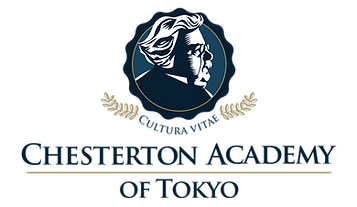
Academics
An Integrated, Classical, Liberal Arts Curriculum
Students at Chesterton Academy enjoy a cohesive, content-rich education. A broad exposure to many different disciplines helps students expand their interests and uncover hidden talents. Each year builds on the previous, so that by the end of senior year, our students are articulate, clear-thinking, well-rounded, and, very importantly, joyful individuals.

The Humanities Program
History, literature, philosophy, theology, and languages are braided together in an integrated curriculum utilizing the Socratic Method.
Humanities Sequence
Grade 9: Ancient World Grade 10: Early Medieval Period Grade 11: High Middle Ages to the Renaissance Grade 12: Modern World
Literature
Our study of literature is tied to the study of history and the rest of the humanities. Students are first introduced to the classical epics of Homer and then exposed to early English classics such as The Canterbury Tales and literary renderings of medieval history. Moving towards the modern period, they read Dante, Shakespeare, Dickens, Dostoevsky, Chesterton, and American literature. Reading and writing go hand in hand, as each student masters the art of the essay in their writing assignments in all subjects.
History
The history classes at Chesterton Academy form the backbone of our curriculum. The four-year history sequence covers ancient history through the Greek and Roman civilizations, early Church history, the Middle Ages, the Renaissance, and the Reformation and Counter-reformation. In senior year, students study the modern era, including the American and French Revolutions, the Industrial Revolution, the Communist Revolution, and the Sexual Revolution. Each history course is tailored to provide a colorful backdrop for literature, art, and science classes.
Philosophy
The ability to understand abstract concepts leads to clear and systematic thinking in all things. We use philosophy to connect the humanities, but also to show its obvious connection to logic and mathematics. We study the development of philosophy from its classical roots focusing on Plato and Aristotle, its dramatic encounter with the early Church, its christening by St. Thomas Aquinas, and its deterioration in the modern era.
Languages
The study of a foreign language is required of all students for three years. All students are required to take two years of Latin and then go on to choose either Latin III, Greek, Spanish, or Italian. Because students may have already studied a foreign language before they arrive at the school we try, as much as possible, to place them in the correct level right from the start, regardless of their grade.
Theology
Theology, “the study of God,” is the context by which all other texts are studied. The principal theological texts studied are the Bible and the Catechism of the Catholic Church. We also read selections from the Church Fathers, documents of the Church Councils, and papal encyclicals.
Maths and Science Program
Math and science are intimately connected; the logic of math is seen in philosophy and God’s handiwork is seen in the sciences.
Maths Sequence
Foundations Track Grade 9 - Euclidean/Analytical Geometry Grade 10 - Algebra I Grade 11 - Algebra II/Trig Grade 12 - Pre-Calculus or Statistics Traditional Track Grade 9 - Euclidean/Analytical Geometry Grade 10 - Algebra II/Trig Grade 11 - Pre-Calculus Grade 12 - Calculus or Statistics C-STEM Track Grade 9 - Euclidean/Analytical Geometry Grade 10 - Pre-Calculus Grade 11 - Calculus (AP Calc AB) Grade 12 - Calculus (AP Calc BC)
Science Sequence
Grade 9: Astronomy and Earth Sciences Grade 10: Biology Grade 11: Chemistry Grade 12: Physics


Fine Arts
Equal emphasis is given to the arts, so that every student learns to draw and paint, sing in the choir, act on the stage, give speeches, and engage in debate.
Music
Chesterton Academy students are exposed to a wide variety of music that they perform chorally several times a year. An education at Chesterton includes music theory, performance, ear training, note reading, and musical analysis. Music history is taught according to the grade level with an emphasis on music development within the Church, and corresponds to the historical period in which the students are immersed. Students perform in grade-level choirs and in the all-school choir at choir concerts, Masses, and the annual Chesterton Gala.
Art
Grade 9 - Ancient Art History | Drawing and Calligraphy Grade 10 - Late Roman and Early European Art History | Pastels and Colors Grade 11 - Late Gothic, Renaissance, and Baroque Art History | Oils Grade 12 - Classical, Romantic, and Modern Art History | Oils
Drama
Grade 10 - Comedy Grade 11 - Drama Grade 12 - Shakespeare
